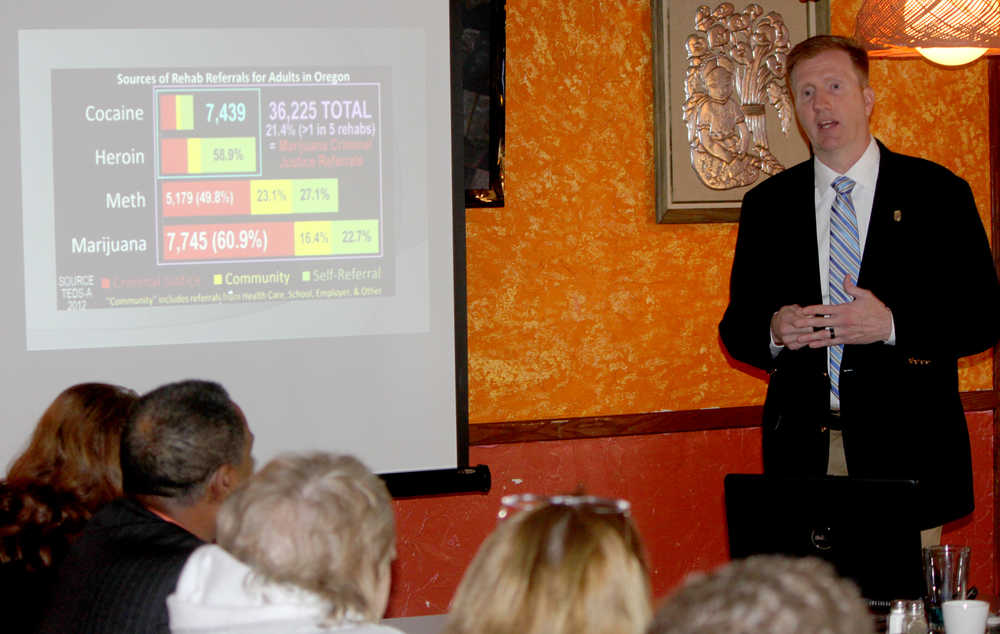During his 20 years in law enforcement, Larry Kirk, police chief with Old Monroe, Missouri, had long been opposed to the legalization of marijuana. It wasn’t until he started to do research on the history of marijuana, he says, that he started to understand the cost and effect the war on drugs has had on the entire country.
Kirk, a representative from Law Enforcement Against Prohibition (LEAP) spoke at a Kenai Rotary Club meeting Monday and shared information of marijuana legalization from a police perspective. Kirk is visiting the Kenai Peninsula this week to provide information to voters prior to the vote on Ballot Measure 2, which would legalize the recreational use and sale of marijuana for adults 21 or older.
“Look at any federal budget and see the poor returns as what we have seen with drug prohibition,” Kirk said. “Our government has spent trillions over the years and we haven’t seen any impact on demand. At some point you have to re-evaluate.”
Kirk said that with the prohibition of alcohol in the 1920s came an increase in crime in the black market violence. Today drug cartels and street gangs control the illegal market. Legalization of marijuana would take money out of the criminal aspect and the state would benefit from the sale economically, he said.
“Every dollar spent in the illegal market goes to street gangs and drug cartels,” he said. “Every dollar spent on marijuana bought legally in Colorado and Washington goes back into the state. Anytime you take something out of the illegal market the better.”
Kirk addressed misinformation and myths that crime has risen in Colorado since marijuana was legalized in January. Using figures from the Colorado state website, Kirk said homicide is down 28 percent, sexual assault is down 10 percent, robbery down five percent and vehicle theft is down 25 percent this year.
While the reduction in crime may not be attributed to marijuana, he said it important to note crime has not gone up as a result.
Kirk said 82 percent of all drug arrests nationwide are for possession with 51 percent for marijuana.
“That is a lot of time and effort that could be spent going after heroin users,” he said.
Drug treatment programs have also seen a strain a high number of marijuana users being court ordered for counseling, which takes away available slots for people with addictions to heroin and cocaine, which have a higher dependency rate than cannabis, he said.
He referenced a problem in Oregon where the addiction community has profited from court ordered addiction programs while many people are not able to get the treatment they need. According to the federal government, 23.5 million Americans are in need of substance abuse treatment, but only one in 10 receive it.
Kirk said so much federal grant money goes into drug units and those resources are used for misdemeanor arrests when there are harder drugs that are more dangerous.
Kirk grew up in a conservative family and as a police officer he has been conditioned to enforce the law, no questions asked. Police officers are also members of the community and should help be part of the problem-solving process, he said.
“We have to allow people to have free will and the ability to make decisions and be responsible,” Kirk said. “It is hard to prohibit something and expect it to work. You can’t bound responsible adults based on the irresponsibility of others.”
Kirk said LEAP set up his travel schedule but he is not paid for the trip and took vacation time. He has visited states all over the country because marijuana legalization is a social issue and all perspectives should be heard.
Former Seattle Police Chief Norm Stamper is in Alaska this week representing LEAP.
Kirk said most of the members of LEAP are retired from law enforcement because as representatives of the cities that employ them, many police chiefs have concern of losing their job is they express their opinion if it is contrary to their municipality.
Kirk is also scheduled to speak in Kodiak Tuesday and Wednesday and return to Soldotna to present at the Soldotna Rotary Club meeting Thursday. He will also participate in a town hall debate in Seward Thursday about the measure with Kristina Woolston from No on 2. The debate will take place at the Seward Community Library Museum at 7 p.m.
Kaylie Klaysmat, executive director of the Alaska Association of Chiefs of Police, said Alaska already has more liberal marijuana laws than most other parts of the country and the statistics show that marijuana arrests are down statewide since 2010.
Klaysmat said marijuana legalization would not alleviate police officers’ time because the initiative would not remove any laws from the book, but time and effort would be spent regulating dispensaries.
Kenai Rotary Club President Scott Hamann said it’s important to get information from all sides on the complex issue of legalization. He said Kirk has fought the battle and seen that it is not working.
Hamann said the hemp industry could flourish in the United States if hemp production wasn’t tied to cannabis. While he said he doesn’t know how the vote will turn out something needs to change.
“This is not a political issue, it’s a social issue that is not going to be solved one way or the other,” he said. “The money spent is not getting us anywhere. Prohibition of alcohol should have taught us something.”
Reach Dan Balmer at daniel.balmer@peninsulaclarion.com.

